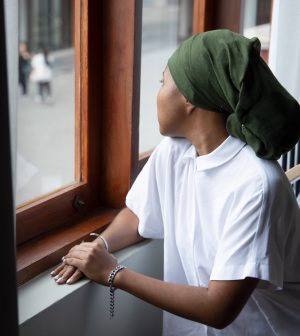- Could Your Grocery Store Meat Be Causing Recurring UTIs?
- Are You Making This Expensive Thermostat Error This Winter?
- Recognizing the Signs of Hypothyroidism
- 10 Strategies to Overcome Insomnia
- Could Artificial Sweeteners Be Aging the Brain Faster?
- Techniques for Soothing Your Nervous System
- Does the Water in Your House Smell Funny? Here’s Why
- Can a Daily Dose of Apple Cider Vinegar Actually Aid Weight Loss?
- 6 Health Beverages That Can Actually Spike Your Blood Sugar
- Treatment Options for Social Anxiety Disorder
Breast Cancer Survivors Age Faster Biologically Than Cancer-Free Women: Study

Women who have survived breast cancer age faster than women who have never had to survive the disease.
The treatment they received impacted their aging rates, according to a new study from Moffitt Cancer Center in Tampa, Fla.
“Breast cancer survivors have higher rates of various age-related diseases, such as cardiovascular disease, and experience faster physical and cognitive decline than women without a history of breast cancer. In this study, we wanted to explore the biology behind this and examine whether certain cancer therapies had a greater long-term impact on survivors,” said study author Jacob Kresovich, an assistant professor at Moffitt.
His team used data from the Sister Study, which identified environmental and biological factors that contribute to breast cancer risk and survival.
More than 50,000 women aged 34 to 74 in the study had a sister diagnosed with breast cancer but had not been diagnosed themselves. The women were enrolled in the study between 2003 and 2009, and then contacted annually to provide health updates.
The United States has nearly 4 million breast cancer survivors.
Participants provided a blood sample at enrollment. Some provided another sample five or 10 years later.
Among the 417 patients included in the study, 190 were selected because they were diagnosed and treated for breast cancer between their first and second blood draws.
The researchers analyzed each blood sample using three metrics of biological aging: PhenoAgeAccel, GrimAgeAccel and DunedinPACE. These metrics use a naturally occurring modification to DNA that changes across the lifespan. The idea is to measure how fast a person is aging at the molecular level.
Women who were treated for breast cancer between the blood draws had faster increases in biological aging compared to those who remained cancer free, according to the report.
The study found only small differences in aging based on race and the types of tumors the women developed, but that was not true for type of treatment.
The investigators looked at three types of breast cancer treatments: endocrine therapy, chemotherapy and radiation therapy.
“We found a strong association between faster biological aging and those who received radiation therapy,” Kresovich said in a cancer center news release. “We hope that these findings will contribute to the conversation of how to best treat and care for breast cancer survivors.”
The study results were published July 19 in the Journal of the National Cancer Institute. The research was supported by the U.S. National Institutes of Health.
More information
The organization Susan G. Komen has more on late effects of breast cancer treatment.
SOURCE: Moffitt Cancer Center, news release, July 19, 2023
Source: HealthDay
Copyright © 2026 HealthDay. All rights reserved.










